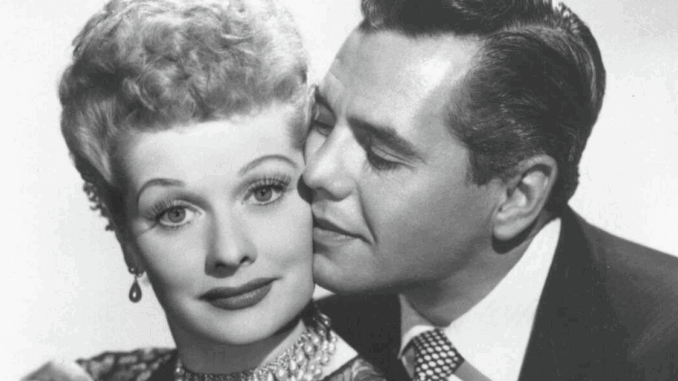
When Desi Met Renée — And Then Met Lucy
Hollywood in the 1940s was no stranger to whirlwind romances, but even by Tinseltown standards, the love story between Desi Arnaz and Lucille Ball burned fast and bright — leaving a few bruised hearts in its wake.
Shortly after Desi Arnaz arrived in Hollywood, fresh from his Broadway acclaim in Too Many Girls, he caught the attention of both studio heads and gossip columnists alike. Movie writer Jimmy Fidler cheekily warned Los Angeles society girls to temper their excitement, writing:
“Local girls who’re getting het up over Desi Arnaz, Broadway glamour boy brought here by R.K.O., will get the brush-off when dansqueen Rene DeMarco arrives from New York.”
At the time, Renée DeMarco, one-half of the famed Dancing DeMarcos with her then-husband Tony, was preparing to join Desi in Hollywood. Her marriage was unraveling, and she and Desi had quietly begun a romance. The plan, reportedly, was to marry once her divorce from Tony DeMarco was finalized.
But fate — and Lucille Ball — had other plans.
Sparks at Eddie Bracken’s Party
Desi met Lucille Ball on the set of Too Many Girls, and according to both stars, the connection was instant. Still, it wasn’t until they saw each other again — at a house party hosted by co-star Eddie Bracken — that the spark truly ignited.
At the time, Lucy had been dating director Al Hall for three years. Their relationship was steady but without serious commitment. Both had frequently said in interviews that they had no plans to marry. Lucy would later reflect on that time, saying:
“I enjoyed his company, his advice and guidance, but was not in love with him.”
That changed the night of Eddie Bracken’s party.
For Lucy and Desi, the realization was immediate: they were in love. Within days, they each broke off their current relationships. It was a bold move — especially for Desi, who had already envisioned a future with Renée.
The Break-Up With Grace

In his memoir, Desi affectionately referred to Renée DeMarco as “Freckles.” When he ended their relationship, he did so with honesty and humility, admitting,
“I don’t know how a thing like this can happen. It’s not natural, it has no reason.”
Renée, with elegance and insight, responded:
“Everything that happens in life is natural and has a reason. Good luck, Desi.”
There was no scandal, no feud, and remarkably — no permanent rift. Despite the heartbreak, Renée DeMarco remained in Lucy and Desi’s lives, ultimately becoming one of Lucille Ball’s closest friends. The grace with which she accepted the end of her romance with Desi speaks volumes about her character — and the tangled, yet tender, bonds that sometimes form in the wake of a love story.
Al Hall and Renée DeMarco Never Really Left
The same was true for Al Hall, who also took the news with quiet dignity. While he had been Lucy’s steady companion for years, he knew that what she had found with Desi was different.
Years later, Al Hall would direct Lucy and Desi in their 1956 feature film Forever, Darling, proving that personal history didn’t preclude professional respect. In Hollywood — where many relationships crash and burn — this small circle managed to preserve something rare: mutual admiration.
A Classic Love Triangle With a Modern Ending
It’s tempting to paint this story as a classic triangle — the Broadway dancer, the radio starlet, the Cuban heartthrob — but in truth, it was more complex and more human. Desi didn’t leave Renée for Lucy out of scandal or betrayal, but out of a lightning-fast connection that defied reason.
And instead of bitterness, both Renée and Al Hall responded with grace and maturity, remaining part of Lucy and Desi’s remarkable orbit in the years to come.
Their love story — and the ripples it caused — remains one of Hollywood’s most layered tales of romance, friendship, and fate. And if ever there was proof that “everything happens for a reason,” this was it.
